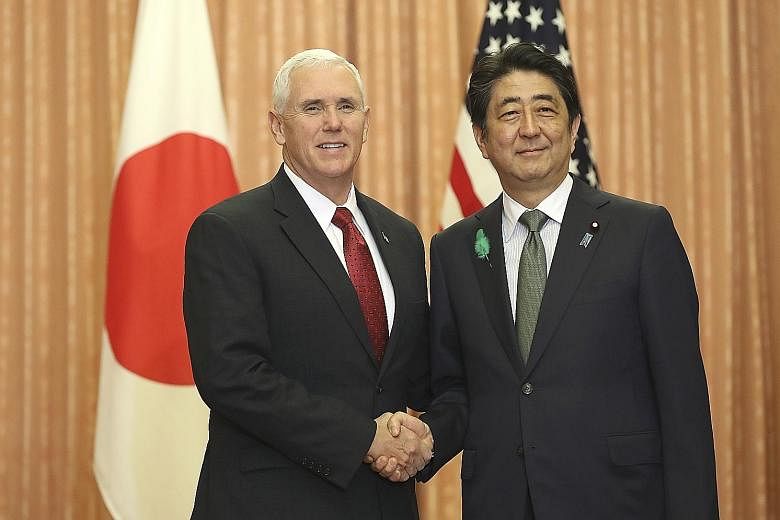The United States kicked off economic talks with Japan yesterday, with an eye on eventually brokering a bilateral trade pact despite the latter's preference for multilateral deals.
US Vice-President Mike Pence, arriving in Tokyo from Seoul, also reiterated Washington's commitment to Japan's security in the face of the North Korean nuclear and missile threat.
At a working lunch with Japanese Prime Minister Shinzo Abe, the two leaders said they will urge China to do more to rein in Pyongyang, which launched a missile unsuccessfully on Sunday, a day after unveiling what appears to be new missiles.
"It's necessary to put pressure on North Korea so that it will accept dialogue in good faith," Mr Abe said. But he stressed: "Dialogue for dialogue's sake is meaningless."
Mr Pence added: "We seek peace always as a country, as does Japan. But peace comes through strength."
Yesterday, he also met Japanese Finance Minister Taro Aso, who said security and the economy are two sides of the Japan-US alliance.
"Economic prosperity is indispensable for the stability of the region," said Mr Aso.
At their hour-long meeting, the two leaders set a framework for their talks, which will strive for "concrete results in the near term" in creating high standards of trade and investment that could be a model for the Asia-Pacific region.
pursue over fears that it will be pressured into opening up its agriculture and auto sectors.
Instead, Japan prefers multilateral deals like the Trans-Pacific Partnership, but this was nixed by US President Donald Trump, who called it a "job-killer".
As they sat down for talks, Mr Pence told Mr Aso: "When President Trump agreed to this dialogue, he envisioned this as a mechanism for enhancing bilateral commercial relations between the US and Japan, and achieving results in the near future. I share that vision and impatience."
Mr Aso in turn called the trade friction that soured bilateral ties in the 1970s and 1980s "a thing of the distant past", and said the two allies are now in "an era of cooperation".
Even as Washington's US$69 billion (S$96 billion) trade deficit with Tokyo cast a shadow over their talks, the two leaders, who will meet again by the year end, pledged to boost cooperation in sectors such as energy and transport, where "improved commercial relations will promote mutual economic benefits and job creation in both countries".
The ultimate goal, for the US at least, is a two-way pact.
At a joint news conference with Mr Aso, Mr Pence said: "At some point in future there may be a decision made between our nations to take what we have learnt in this dialogue and commence formal negotiations for a free trade agreement."
Earlier in Seoul, Mr Pence said at an American Chamber of Commerce meeting that Washington will review and reform a five-year-old trade deal with South Korea to narrow its trade deficit.
He noted it was "most concerning" that the US trade deficit with South Korea has more than doubled since their bilateral trade pact came into effect, from US$13.2 billion in 2011 to US$27.6 billion last year.
Dr Go Myong Hyun of the Asan Institute of Policy Studies said the new South Korean president, who will be elected on May 9, will be under pressure to rebalance trade with the US. He also said it was reassuring that Mr Pence had not cited trade reforms as a pre-condition for the US-South Korea military alliance.
•Additional reporting by Chang May Choon in Seoul

